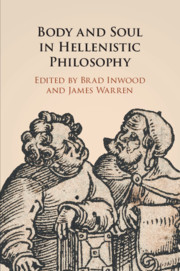Book contents
- Body and Soul in Hellenistic Philosophy
- Body and Soul in Hellenistic Philosophy
- Copyright page
- Contents
- Contributors
- Abbreviations
- Introduction
- Chapter 1 Hellenistic Medicine, Strato of Lampsacus, and Aristotle’s Theory of Soul
- Chapter 2 Herophilus and Erasistratus on the Hēgemonikon
- Chapter 3 Galen on Soul, Mixture and Pneuma
- Chapter 4 The Partition of the Soul
- Chapter 5 Cosmic and Individual Soul in Early Stoicism
- Chapter 6 Soul, Pneuma, and Blood: The Stoic Conception of the Soul
- Chapter 7 The Platonic Soul, from the Early Academy to the First Century ce
- Chapter 8 Cicero on the Soul’s Sensation of Itself: Tusculans 1.49–76
- Bibliography
- Index Locorum
- Subject Index
Chapter 4 - The Partition of the Soul
Epicurus, Demetrius Lacon, and Diogenes of Oinoanda
Published online by Cambridge University Press: 20 May 2020
- Body and Soul in Hellenistic Philosophy
- Body and Soul in Hellenistic Philosophy
- Copyright page
- Contents
- Contributors
- Abbreviations
- Introduction
- Chapter 1 Hellenistic Medicine, Strato of Lampsacus, and Aristotle’s Theory of Soul
- Chapter 2 Herophilus and Erasistratus on the Hēgemonikon
- Chapter 3 Galen on Soul, Mixture and Pneuma
- Chapter 4 The Partition of the Soul
- Chapter 5 Cosmic and Individual Soul in Early Stoicism
- Chapter 6 Soul, Pneuma, and Blood: The Stoic Conception of the Soul
- Chapter 7 The Platonic Soul, from the Early Academy to the First Century ce
- Chapter 8 Cicero on the Soul’s Sensation of Itself: Tusculans 1.49–76
- Bibliography
- Index Locorum
- Subject Index
Summary
Much has been written about Epicurus’ psychology. However, despite the enduring popularity of the theme, to the best of my knowledge no contribution has yet specifically been devoted to the reception of Epicurus’ psychology within the Epicurean tradition outside of Lucretius. The present essay therefore begins with some paragraphs of Epicurus’ Letter to Herodotus devoted to the soul, in order to ascertain how Epicurus’ psychology was represented by certain later Epicureans, most notably Demetrius Lacon (second to first century bc) and Diogenes of Oinoanda (second century ad), who lived not just in different ages but in very different places (the former, who never became scholarch, lived between Miletus and the mother school of Athens; the latter, between Oinoanda and Rhodes). In particular, I will set out to determine what the Epicureans made of the so-called bipartition between a rational and a non-rational part of the soul. While this theory is nowhere to be found in the Letter to Herodotus, it is espoused by Lucretius through the distinction between animus (the rational part) and anima (the non-rational part). In order to present as comprehensive a picture of the context as possible, it is best to start with Epicurus, and in particular with a challenging passage in §§ 63–4 of the Letter to Herodotus.
- Type
- Chapter
- Information
- Body and Soul in Hellenistic Philosophy , pp. 89 - 112Publisher: Cambridge University PressPrint publication year: 2020
- 2
- Cited by



